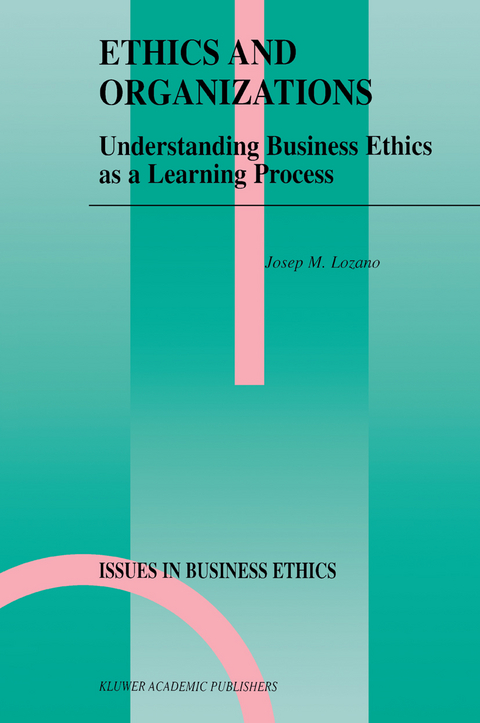
Ethics and Organizations
Springer-Verlag New York Inc.
978-1-4020-0362-2 (ISBN)
0. Introduction: like oil and water?.- 1. Business ethics as applied ethics.- 1.1. BE: a case of applied ethics?.- 1.2. BE as “applied” ethics: a preliminary proposal for integration.- 2. Business ethics: an on-going process.- 2.1. Introduction: a progressive Self-awareness.- 2.2. A first historical approach to BE.- 2.3. The recent development of BE in Europe.- 2.4. What issues should BE address?.- 2.5. BE: a first attempt at a systematic ordering.- 2.6. The acceptance or rejection of BE as a possible (il)legitimization of predominant practices and values.- 2.7.The impossible dissolution of BE in individual ethics.- 2.8. The ethics of organizations as the core of BE.- 3. BE’s self-awareness: unresolved tension and a call for integration.- 3.1. BE: one discipline or two?.- 3.2. Managers’ moral reasoning as a metaphor for and expression of the problem.- 3.3. Integration in the framework of BE: a demand -at least-acknowledged.- 3.4. Beyond ethics as a toolbox.- 3.5. A note about civic ethics as a possible framework for BE.- 4. An illustrative debate: corporate social responsibility.- 4.1. Introduction.- 4.2. A preliminary question: Is the corporation a moral subject?.- 4.3. Corporate social responsibility.- 4.4. Is the corporation in question?.- 4.5. Friedman: the most controversial reference.- 4.6. The diversity of arguments about corporate social responsibility.- 4.7. Corporate social responsibility: a diversity of concepts.- 4.8. The place of corporate social responsibility in the framework of BE.- 5. Stakeholders: who are they and what are their interests?.- 5.1. Power in the corporation, power of the corporation.- 5.2. Stakeholders, an understanding of the corporation.- 5.3. Stakeholders: an analytical classification.- 5.4. Stakeholders: beyond analysis.- 5.5.Stakeholders in an ethics of organizations.- 6. Corporate codes: constructing criteria and goals?.- 6.1. Professional codes as a point of reference.- 6.2. Codes and their ambivalence.- 6.3. Management as a profession: a significant absence.- 6.4. Corporate codes of ethics: a descriptive approach.- 6.5. Codes of ethics: more ethics or more control?.- 7. Corporate cultures: managing values?.- 7.1. Some questions about the concept of organizational culture.- 7.2. Corporate culture and ethics: an ambigous relationship.- 7.3. Ambiguities in the search for excellence.- 7.4. Opening the door to Aristotelian tradition.- 7.5. Final considerations: the outlook for BE.- 8. Integrating ethics in organizations.- 8.1. The paths towards integration: decision-making, a fact or a process?.- 8.2. The paths towards integration: the organization as a project.- 8.3. The paths towards integration: institutionalizing ethics.- 9. Humanization (also) as a process of organizational learning.- 9.1. The emerging knowledge society.- 9.2. Transforming organizational paradigms.- 9.3. An understanding of organizations that includes acknowledging the value of individuals and individuals as value.- 10. The learning organization as the matrix of business ethics.- 10.1. BE’s three “moments” as an organizational learning process.- 11. References.- 12. Index.
| Erscheint lt. Verlag | 30.11.2001 |
|---|---|
| Reihe/Serie | Issues in Business Ethics ; 15 |
| Zusatzinfo | VIII, 192 p. |
| Verlagsort | New York, NY |
| Sprache | englisch |
| Maße | 155 x 235 mm |
| Themenwelt | Geisteswissenschaften ► Philosophie ► Allgemeines / Lexika |
| Geisteswissenschaften ► Philosophie ► Ethik | |
| Wirtschaft ► Betriebswirtschaft / Management ► Unternehmensführung / Management | |
| ISBN-10 | 1-4020-0362-5 / 1402003625 |
| ISBN-13 | 978-1-4020-0362-2 / 9781402003622 |
| Zustand | Neuware |
| Haben Sie eine Frage zum Produkt? |
aus dem Bereich


